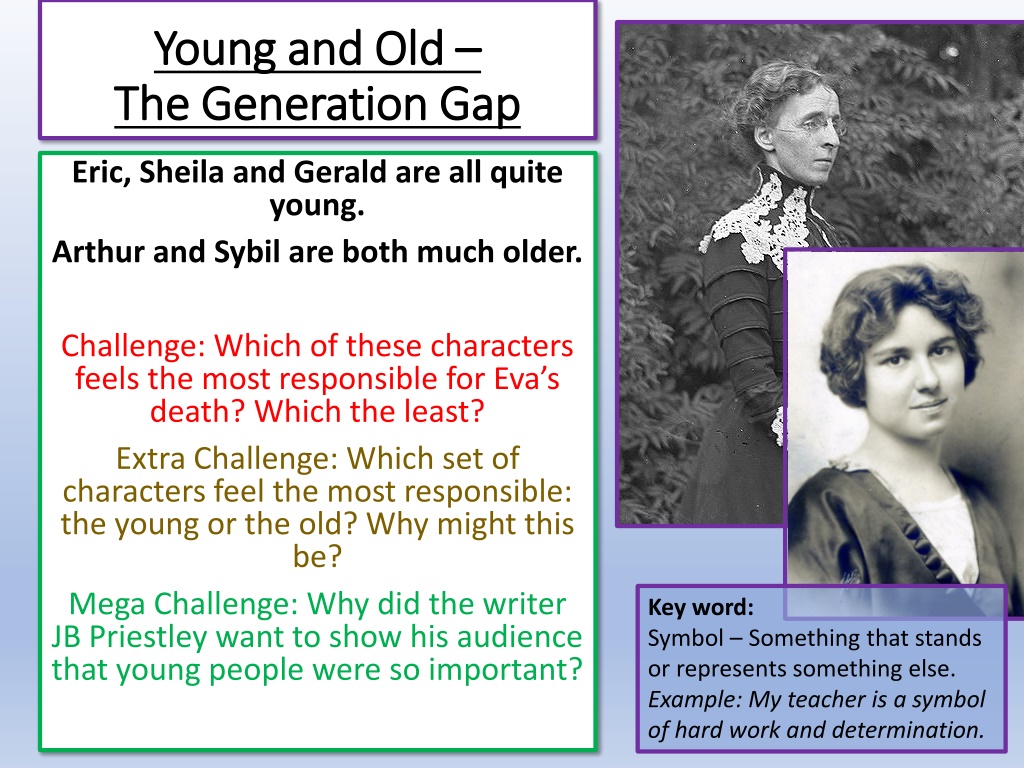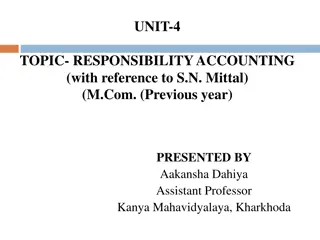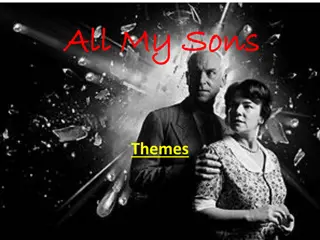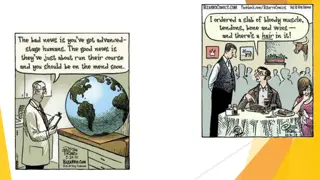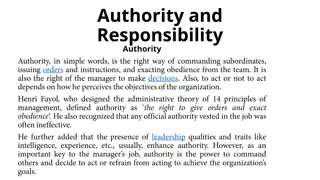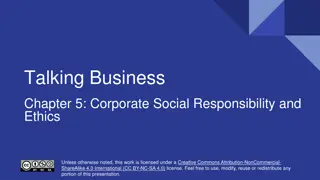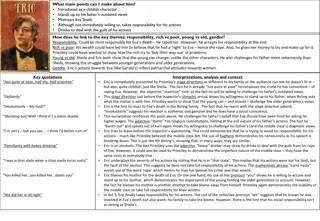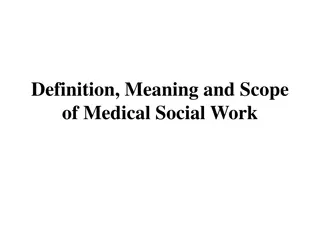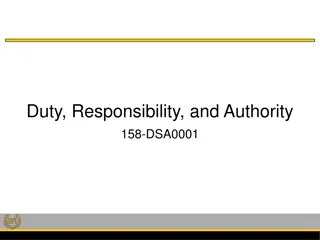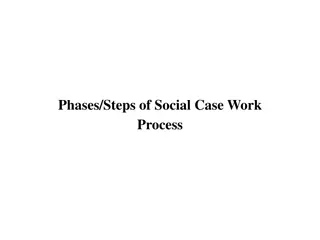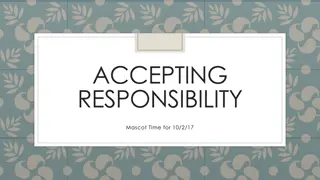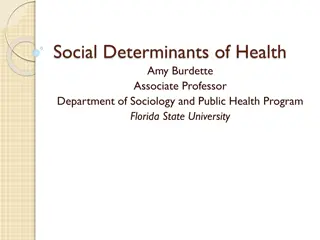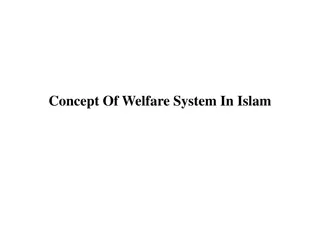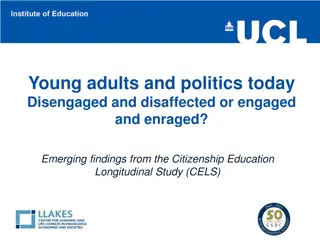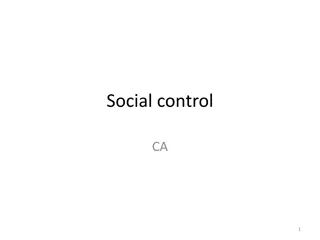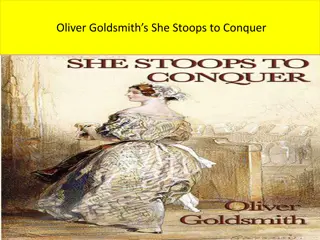Exploring Responsibility and Social Change in 'Young and Old' Play
In the play "Young and Old," the characters Eric, Sheila, and Gerald represent the younger generation, while Arthur and Sybil symbolize the older generation. The story delves into the concept of responsibility, highlighting the different attitudes towards Eva's death. Arthur and Sybil, despite being confronted with their roles, show a lack of accountability. The characters' placement on the capitalist-socialist scale evolves throughout the play, reflecting shifts in individualist and community-minded values. By examining these dynamics, the play raises questions about the importance of young people, social responsibility, and the impact of generational differences.
Download Presentation

Please find below an Image/Link to download the presentation.
The content on the website is provided AS IS for your information and personal use only. It may not be sold, licensed, or shared on other websites without obtaining consent from the author. Download presentation by click this link. If you encounter any issues during the download, it is possible that the publisher has removed the file from their server.
E N D
Presentation Transcript
Young and Old Young and Old The Generation Gap The Generation Gap Eric, Sheila and Gerald are all quite young. Arthur and Sybil are both much older. Challenge: Which of these characters feels the most responsible for Eva s death? Which the least? Extra Challenge: Which set of characters feel the most responsible: the young or the old? Why might this be? Mega Challenge: Why did the writer JB Priestley want to show his audience that young people were so important? Key word: Symbol Something that stands or represents something else. Example: My teacher is a symbol of hard work and determination.
Learning objectives To describe the difference in attitudes of responsibility between the young and old characters To explain how both sets of characters are different and why To evaluate why the writer JB Priestley created this tension in the play
Character Speedometers Where are the characters on the scales of capitalist and socialist at the start and the end of the play? Explain the decisions you made. Why have the characters changed or not changed? What specific parts of the play showed the changes that were happening in the characters? Why do you think those changes happened? Capitalist Socialist
Arthur and Sybil Sheila Act 3 Act 1 Socialist Community Capitalist Individual Socialist Community Capitalist Individual Eric Gerald Socialist Community Capitalist Individual Socialist Community Capitalist Individual The Inspector Where are the characters on the scales of capitalist and socialist at the start and the end of the play? Explain the decisions you made. Why have the characters changed or not changed? What specific parts of the play showed the changes that were happening in the characters? Why do you think those changes happened? Socialist Community Capitalist Individual
Act 1: Arthur Birling: But what so many of you don't seem to understand now, when things are so much easier, is that a man has to make his own way has to look after himself Arthur and Sybil Act 3 Act 1 Socialist Community Capitalist Individual Act 3 Birling: (heartily) Nonsense! You'll have a good laugh over it yet. Look, you'd better ask Gerald for that ring you gave back to him, hadn't you? Then you'll feel better. Despite being shown by the Inspector that they are intrinsically linked to Eva Smith s death, both Arthur and Sybil Birling refuse to take any responsibility for their own actions. They remain individuals, detached from the rest of society even if they may have felt some slight pity for Eva. Act 1: Sheila: (taking out the ring) Oh it's wonderful! Look mummy isn't it a beauty? Oh darling - (she kisses Gerald hastily.) Sheila Act 3 Act 1 Socialist Community Capitalist Individual Act 3 Gerald: Everything's all right now, Sheila. (Holds up the ring.) What about this ring? Sheila: No, not yet. It's too soon. I must think. It s pretty clear that Sheila goes through a transformation from innocent, na ve girl into independent, caring and responsible adult by Act 3. Look at the contrast in attitudes about her engagement ring between Acts 1 and 3.
Act 1: Gerald: Look here, sir. Wouldn't you rather I was out of this? Gerald Act 3 Act 1 Act 3 Gerald: Then, don't you see, there's still no proof it was really the same girl. He might have showed you the photograph of any girl who applied to the committee. Socialist Community Capitalist Individual Even though Gerald clearly had some sort of affection for Daisy Renton, he still abandoned her and always planned to do so (he says so himself). At the beginning of the play he tries to detach himself from the Inspector s investigation and is very keen at the end of the play to discredit the Inspector and thus absolve himself of any responsibility for Eva s death. Act 1: Gerald: I believe you're right, sir. Eric: What about war? Eric Act 3 Act 1 Act 3 Eric: I don't see much nonsense about it when a girl goes and kills herself. You lot may be letting yourselves out nicely, but I can't. Nor can mother. We did her in all right. Socialist Community Capitalist Individual Eric is deeply uncomfortable at the beginning of the play and we are not sure why, but we come to discover he was in a relationship with Eva and used her for his own sexual gratification something he feels guilty about and accepts full responsibility for by the end of the play.
Read these key quotes from the end of Act 3 carefully. Birling: (pointing to Eric and Sheila) Now look at the pair of them the famous younger generation who know it all. And they can't even take a joke - Is there a gap forming between the two generations (young and old)? If so, why is it happening? Sheila: But you're forgetting one thing I still can't forget. Everything we said had happened really had happened. If it didn't end tragically, then that's lucky for us. But it might have done. Where does Gerald lie in this generation gap ? Why do you think Priestley wanted to have a character like Gerald in the play if he is not fully converted like Sheila and Eric? Sheila: (passionately) You're pretending everything's just as it was before. Eric: I'm not! Sheila: No, but these others are. How does this final scene differ from the opening of the play? What has caused such a huge change and why was it so important to Priestley to show it to his audience? Sheila: So nothing really happened. So there's nothing to be sorry for, nothing to learn. We can all go on behaving just as we did. Mrs Birling: Well, why shouldn't we?
It can be argued that Priestley designed An Inspector Calls to be a kind of allegory An allegory is where characters in a text act as symbols of ideas. In An Inspector Calls, different characters represent different sections of Edwardian society. Eric is a young and wealthy man that struggles to find his own identity and finally finds a voice through his sense of guilt and responsibility for others. Sheila is a young and wealthy female that is treated as a child by the other characters. There were many women like Sheila in British society during the Edwardian period, but her change in outlook and personality driven by the socialist ideas of The Inspector is more reflective of the Suffragette movement that campaigned for greater rights for women, including the right to vote. Gerald is more reserved and less willing to change he represents those slightly older people who still cling on to the past but have the capacity to change. Mr and Mrs Birling are very much the old-fashioned stalwarts of capitalism that refuse to change despite all the evidence presented to them showing they need to. They represent the past and a by-gone era, according to Priestley.
Youve just walked out of the first ever performance of An Inspector Calls in 1945 You are 23, you fought in World War II and you survived amazingly. Your father fought and died in World War I. You are a car mechanic, earning a pretty poor wage and with little hope of promotion any time soon. There is a General Election coming up that will determine the first Post-War government for the future after the Second World War. Your vote is between Winston Churchill, the man who led Britain to victory during the War and a trusted older head, or Clement Attlee, a man promising social reforms for the whole of society. Discussion: How would you vote and why?
